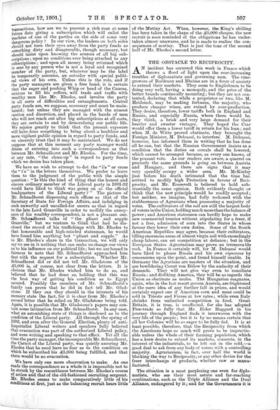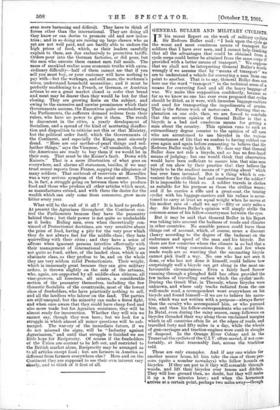THE OBSTACLE TO RECIPROCITY.
AN incident has occurred this week in France which throws a flood of light upon the ever-increasing troubles of diplomatists and governing men. The vine- growers of Bordeaux and Rheims are in a fever of anxiety to extend their markets. They seem to Englishmen to be doing very well, having a monopoly, and the price of the better brands continu ally mounting; but they are not con- tented, declaring that while a proprietor or two, like M. Heidsieck, may be making fortunes, the majority, who produce cheaper wines, are ruined by over-production. They desire, therefore, lower tariffs both in England and Russia, and especially Russia, where there would be, they think, a brisk and very large demand for their heavier and sweeter vintages. They hoped the Czar would offer them a lower tariff in return for his loan ; and when M. de Witte proved obstinate, they besought the Foreign Minister, H. Delcass6, to interfere. M. Deleasse, however, has informed them in writing that he has done all he can, but that the Russian Government insists as a condition that the duties on cereals shall be lowered, which cannot be arranged because, as every one knows, of the peasant vote. As our readers are aware, a quarrel on precisely the same grounds is going on between Austria and Hungary, and there are signs that it may very speedily occupy a wider area. Mr. McKinley just before his death intimated that the time hat. arrived to modify high Protection in favour of Reci- procity, and Mr. Roosevelt is believed to hold sub- stantially the same opinion. Both evidently thought or think that the new principle would be readily accepted ; but neither, we imagine, had fully reckoned with the stubbornness of Agrarians when possessing a majority of votes. The cultivators of the soil are still the largest body of voters in the Union, holding much more than the balance of power; and American statesmen can hardly hope to make new commercial treaties without stipulating for a freer, if not a free, admission of corn into the States in whose favour they lower their own duties. Some of the South American Republics may agree, because their cultivators, tilling enormous areas of almost virgin soil with exceedingly cheap labour, can set competition at defiance ; but in the European States Agrarianism may prove an irremovable rock. In France it certainly will, for H. Delcass6 would have liked to please Russia and his own vign,erans by concessions upon the point, and found himself unable. In Germany the Agrarians are masters of the situation, and are bewildering Count von Billow by the audacity of their demands. They will not give way even to conciliate Russia; and disliking America, they will be as regards the Union as obstinate as mules. The Hungarian magnates, again, who in the last resort govern Austria, are frightened. at the mere idea of any further fall in prices, and would certainly expect one if American corn and meat could be sold in Trieste and Fiume at low rates ; while even Italy shrinks from unlimited competition in food. Great Britain, it is true, is unaffected, for she has adopted Free-trade so fully that Mr. Rider Haggard in his journey through England finds it interwoven with the very life of the people ; but it is by no means certain that all her Colonies will be so eager to be fully fed. It is at least possible, therefore, that the Reciprocity from which the Americans hope so much will prove to be impractic- able unless the whole of their farming population, which has a keen desire to extend its markets, consents, in the interest of the industrials, to be left out in the cold,—a good deal to ask from any body of voters with a controlling majority. Agrarianism, in fact, over half the world is blocking the way to Reciprocity, or any other device for the freer interchange of products, whether raw or manu- factured. • The situation is a most perplexing one eveh for diplo- matists, who see their most astute and far-reaching combinations, such as the Triple Alliance and the Dual Alliance, endangered by it; and for the Governments it is even more harassing and difficult. They have to think of forces other than the international. They are doing all they know or can devise to .promote old and new indus- tries.; and in so doing are raising up large classes who as yet are not well paid,, and are hardly able to endure the high prices of food, which, as their leaders carefully explain to them, are due exclusively to protective tariffs. Orders pour into the German factories, or did pour, but the men who execute them cannot earn full meals. The mass of mankind realise some economic truths with extra- ordinary difficulty—half of them cannot see that if you sell you must buy, or your customer will have nothing to pay with—but the workmen, and still more, the workmen's wives, understand household necessities ; and it must be perfectly maddening to a French, or German, or Austrian artisan to see a great market closed in order that bread and meat may be dearer than they would be but for that closing. They are growing fierce on the subject, and owing to the excessive and unwise prominence which their Governments assume, the Executives quite overshadowing the Parliaments, the sufferers demand redress from their 'tiers, who have no power to give it them. The result is discontent in the cities, a yearly development of Socialism, and a spread of the kind of muttering disaffec- tion and disposition to criticise not this or that Ministry, but the political order itself, which the Governments of the Continent, and especially the Kings, most sincerely dread. " Here are our mother-of-pearl things and red- leather things," says the Viennese, " all unsaleable, though the Americans are ready to buy them if 'we would let in their corn. That must be the Kaiser's fault. Down with Kaisers." That is a mere illustration of what goes on everywhere, and alarms all statesmen, besides, if we may trust recent reports from France, sapping the allegiance of many soldiers. That outbreak of reservists at Marseilles Was a very serious symptom of the social unrest. There is, in fact, a struggle going on between those who produce food and those who produce all other articles which must, as manufactures extend, and with them the desire for the wealth which can only come from commerce, grow more bitter every year.
• What will be the end of it all ? It is hard to predict. At present the Agrarians throughout the Continent con- trol the Parliaments because they have the peasantry behind them ; but their power is not quite so unshakable as it looks. Ruling men, even when theoretically con- vinced of Protectionist doctrines, are very sensitive about the price of food, having a pity for the very poor which they do not always feel for the middle class; they hate quarrelling with their cities ; and they have a sense of affront when ignorant persons interfere effectually with their management of international relations. They are not quite so fond, either, of the landed class, which is an obstinate class, as they profess to' be, and on the whole they are very seldom rabid Protectionists. Their weight, which is immensely great because they can give military orders, is thrown slightly on the side of the artisans, who, again, are supported by all middle-class citizens, all vine-growers, all foresters, all miners, a considerable section of the peasantry themselves, including the few theoretic Socialists of the countryside, most of the lowest class of freeholders, who have practically nothing to sell, and all the landless who labour on the land. The parties are still unequal; but the minority can make a fierce fight, and when once aware that they could have cheap food and also more trade but for Agrarian resistance, they will be almost ready for insurrection. Whether they will win we cannot say, though they won here; but we look for a struggle in which almost all minor questions will be sub- merged. The war-cry of the immediate future, if we do not misread the signs, will be " Industry against Agrarianism," and until that struggle is finished we see little hope. for Reciprocity. Of course if the freeholders of the Union are content to be left out, and restricted to the British market alone, Reciprocity may be arranged as to all articles except food ; but are farmers in America so different from farmers everywhere else ? Here and on the Continent they are supposed to see their own interest very clearly, and to think of it first of all.















































 Previous page
Previous page